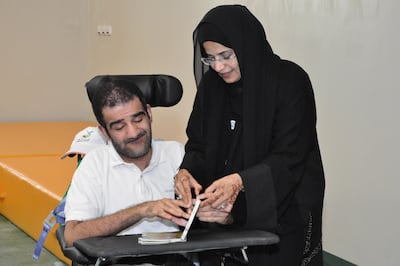A woman known among Emiratis as “Mother of the Blind” is among the seven female members to have been publicly elected to the UAE’s Federal National Council.
Naema Al Mansouri, 49, received the most votes out of the women candidates in Abu Dhabi (444) and the second most of the women candidates across the country, after Sabreen Al Yamahi from Fujairah (955).
Ms Al Mansouri may not have campaigned as widely as the other candidates, but she credited her reputation among Emiratis for her success.
"Being labelled as Mother of the Blind is a huge honour and something that I cherish. When a blind child calls me mother, I truly feel like their mother and it gives me so much pride," she told The National.
“They played a huge role in me winning the elections. I owe it to them and the love of all the people who voted for me without even knowing me but from seeing my CV and social media posts.”
But her title did not come easily; Ms Al Mansouri has spent the last 27 years working with people with disabilities. She was the first Emirati to become fluent in Braille after teaching herself to read it in 1992 while teaching at a school for children with physical disabilities.

"They brought in a group of deaf children and I realised that they were in a world of their own because they couldn't hear what was being said," she said.
Ms Al Mansouri went on to work at Zayed Higher Organisation for Humanitarian Care. During her time as director of the Blind Care Office, she established the country’s first Braille printing press.
“It is the Braille printing press that I feel is one of my most important projects,” said the mother of five and grandmother to three.
Ms Al Mansouri also volunteers with Emirates Red Crescent, and has travelled to Lebanon and Syria as part of campaigns to help refugees.
In her new role, Ms Al Mansouri said she would remain committed to helping people with disabilities by pushing for more inclusive legislation.
She said she would focus on several issues but closest to her heart are those that ensure people with disabilities have all they need — from effective signboards to ramps and greater accessibility.
“I would like to strengthen their role in different sectors, starting with providing suitable environments to their education and employment areas. The UAE has made many of these services available but we should continue to seek to improve and add to them,” she said.
She said the FNC had made strong headway with advocating for the rights of people with special needs but that there was always room for improvement and updating legislation.
“I do thank every person who gave me their vote. This is a national joy and my colleagues and I will be hand in hand with the public who have entrusted and believed in us.”
The final list of elected Federal National Council members will be revealed on Sunday — a little over a week after the main Election Day.
The preliminary list of 20 elected Emiratis was announced on October 5 and candidates were given two days to file any objections or appeals.
An appeal costs Dh3,000 to file and the money is refunded to the candidate if a decision is issued in their favour.
On Thursday, the National Election Committee said it received six appeals — two from Abu Dhabi and one each from Sharjah, Ras al Khaimah, Umm Al Quwain and Fujairah. The results will be announced at a committee meeting on Sunday.
The 20 remaining members of the council remain to be appointed by the ruler of each emirate. Thirteen of these are expected to be women, to ensure gender parity in the advisory council — as ordered by President Sheikh Khalifa.

